Marilu Henner once said, “Being in control of your life and having realistic expectations about your day-to-day challenges are the keys to stress management, which is perhaps the most important ingredient to living a happy, healthy and rewarding life.”

However, stress can become extremely overwhelming to the point where it may leave an individual suffering from stress feeling incapacitated.1 Everyone copes with stress differently in accords with culture and personal experiences. Some people self-medicate with drugs and alcohol, while others turn to the medical system for pharmaceuticals. These two routes of stress-release each have a plethora of potentially detrimental outcomes, dependency and toxicity being two major components. Thus, others seek alternative routes which might have fewer concerns, such as meditation or herbal supplements. One of these herbal alternatives that has been used for millennia is Withania somnifera (Ashwagandha).2
The oldest use case of Withania somnifera is that of the Ayurvedic practice, which dates back as early as 2,000 BCE with texts described in the Atharvaveda.3
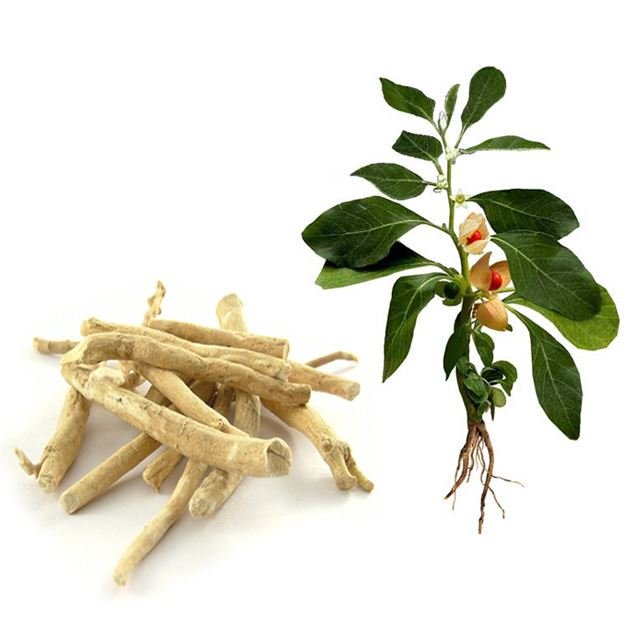
Typically, the dried roots of Withania somnifera are taken in capsules as an extract or as a tincture.2
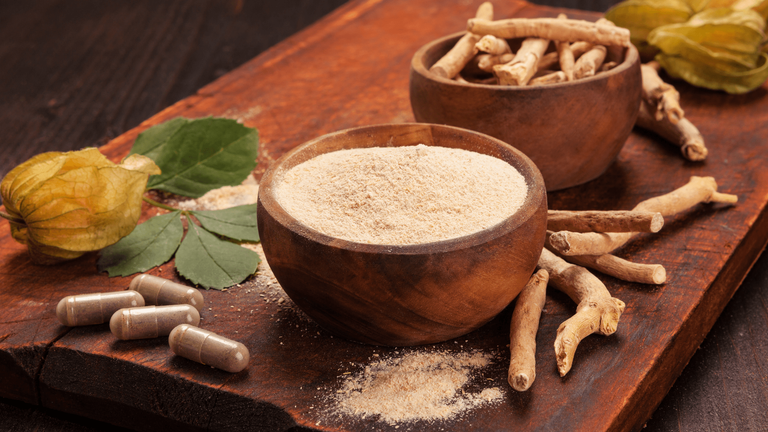
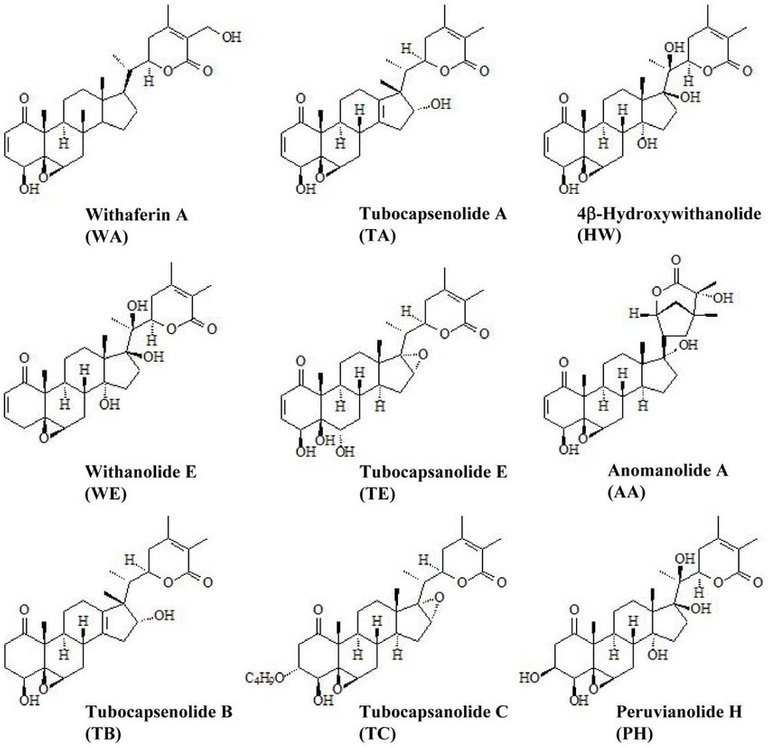
There is very little funding made available for the research of ideas which are not able to be patented, herbal medicaments surely fall under this category.
A lack of funding results in a lack of viable research data which verifies or dismisses claims being made about a thing’s potentiality. Withania somnifera is no stranger to this concept. There are currently only a handful of randomized controlled studies which attempt to further understand this herb and any of its possibilities. Two of these studies, one by K. Chandrasekhar, et al., the other by Lopresti AL, et al., aimed at understanding the adaptogenic role of Withania somnifera in managing stress.9,10
The First Study
In the study by K. Chandrasekhar, et al., “A Prospective, Randomized Double-Blind, Placebo-Controlled Study of Safety and Efficacy of a High-Concentration Full-Spectrum Extract of Ashwagandha Root in Reducing Stress and Anxiety in Adults,” researchers “[aimed] to evaluate the safety and efficacy of a high-concentration full-spectrum extract of Ashwagandha roots in reducing stress and anxiety and in improving the general well-being of adults who were under stress.”9 Sixty-four adults (23 women, 41 men), ages between 18-54, who were without psychiatric symptoms other than stress, were randomized into either the control group (placebo) or to the treatment group (300mg W. somnifera full-spectrum extract) and were instructed to take one capsule two times a day after food with plain water for sixty days.9
Measurements for outcomes which were used in this study were the perceived stress scale (PSS), the depression and anxiety stress scale (DASS), the general health questionnaire-28 (GQH-28), and morning serum cortisol levels.9 Measurements were taken on day 0, before interventions occurred, and on day 60, at the end of the trial.9 Each group had very similar scores at baseline.9 Additional information, such as compliance and adverse reactions, were reported during check-in phone calls at day 15, 30, and 45.9 Sixty of the original sixty-four participants completed the trial, with two from the treatment group and one from the placebo group failing to follow-up.9
The results showed significant improvement in all measurements for the treatment group versus the placebo group.9 The treatment group showed a 44.0% reduction in PSS scores, compared to the 5.5% reduction in the placebo group.9 The authors said the following of the GQH-28 scores:
In the Ashwagandha group, by Day 60 there was a significant reduction in scores corresponding to all of the item-subsets: 76.1% for the “Somatic” item-subset, 69.7% for the “Anxiety and Insomnia” item-subset, 68.1% for the “Social Dysfunction” item-subset, 79.2% for the “Severe Depression” item-subset. In contrast, in the placebo control group, the corresponding reductions in scores were much smaller: 4.9%, 11.6%, –3.7% and –10.6%, respectively. As can be readily seen, the difference is at least 58 percentage points and as high as 89 percentage points.9
Scores in the treatment group for the DASS ranged from 64%-77% for each subset, where the placebo group had scores ranging from -4%-10%, showing significant difference in comparison.9 A reduction of 27.9% of serum cortisol was found in the treatment group, compared to only a 7.9% reduction in the placebo group.9 All adverse events reported were mild in nature and no known mechanism correlates the drug of study.9
The Second Study
Lopresti AL, et al., also aimed to evaluate the efficacy of treating stress using standardized W. somnifera extracts. Sixty adult participants (ages 18-65) with generalized stress, who were without any chronic disease which might affect stress/anxiety or restrict normal, daily function, took part in a sixty day double-blind trial in which participants would receive either a 240mg ashwagandha extract capsule, or a placebo capsule, to be taken once a day after dinner with 250mL of water.10 Participants were to attend a check-up at one of two identified health care centers on six occasions where cortisol levels, DHEA-S levels, and anxiety/depression were assessed using blood sampling and clinician-administered Hamilton Anxiety Rating Scale (HAM-A), and self-reported Depression, Anxiety, Stress Scale-21 (DASS-21), respectively.10 Assessments of testosterone levels were only taken at baseline and at sixty days.10
The results of this study showed that W. somnifera has the potential to treat the effects of stress.10 A 41% reduction in HAM-A was observed in the treatment group, compared to the 24% reduction in the placebo group.10 A 30% reduction in DASS-21 scores was observed in the treatment group, with a 10% reduction in the placebo group.10 Cortisol levels were reduced by 23% in the ashwagandha group, no significant changes in cortisol occurred in the placebo group (0.5% increase).10 An 8% reduction in DHEA-S was observed in the ashwagandha group with no significant changes in the placebo group.10 Testosterone changes were only significant in male participants with an 11.4% increase in testosterone in the treatment group and no significant changes in the placebo group.10
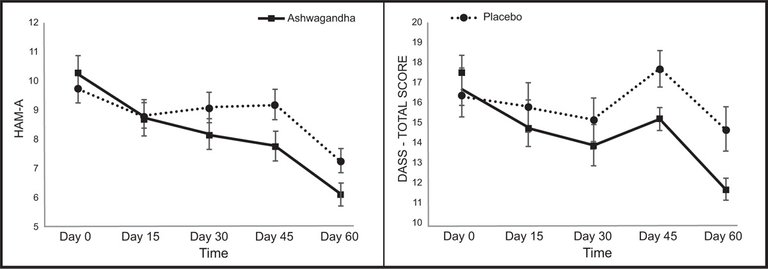
I found myself thoroughly intrigued with the results shown in the literature regarding W. somnifera and its adaptogenic properties having recently studied this herb for another article.
Thus, I chose to conduct a short trial on myself to see if I might find any benefit from its use. I purchased an organic tincture of W. somnifera, produced by a local herbal extractor, standardized at 175mg of herb per .7mL (~1 dropperful). The instructions say to consume 1 dropperful in water between meals twice a day. I set forth with the goal of following these directions for two weeks to see if I felt any different.
My self-perceived stress levels and ability to cope with stressful situations at day 0 was certainly quite high as the holidays approach and with the end of the semester here. I immediately felt a change in the way I was perceiving stressful situations on the day I began taking the tincture. I’m not sure if this was merely placebo (if the herb takes time to build up in the system) or if it is just a quick acting herb but I definitely felt better.
I experienced two flare-ups from fibromyalgia during this period, once during the first week, and again at the end of the two weeks. I found it quite difficult to remember to take the tincture during these moments and so there were some days I only took it once, and two days I forgot completely to take it (once in the first week, and the last day of the trial). However, whatever benefits I had received from each previous dosing was able to extend through the days I missed a dose.
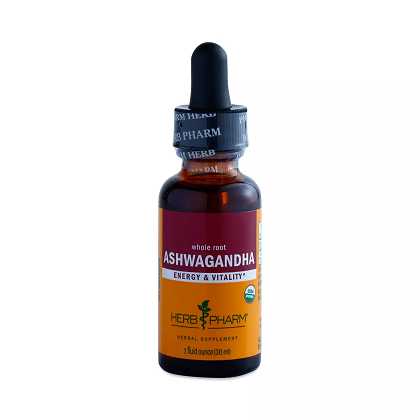
I am doing my best to continue taking this supplement each day now that the trial has ended because it seems to be providing me with a barrier to what would normally be overwhelming stress.
I think that the dosage is at a good level because though each study had different dosages, results were very similar. My own personal results show to be of great benefit although the first study covered shows that as much as twice my dosage would be safe to consume. I have also now witnessed firsthand part of why it is difficult to run trials on human subjects. Life is not static and things can change in a moment’s notice. These unforeseen changes can make it extremely difficult for one to continue participating in a trial for a multitude of reasons. Pain, in my case, can definitely take over a person’s life and create an obstacle to completing a study.
Stress can be debilitating, leaving individuals feeling hopeless.
The Ayurvedic medicine Ashwagandha (Withania somnifera) might be of great benefit in such cases. One could easily see that there is much potential to using W. somnifera with several studies showing significant improvements in stress related outcomes. Coping with stress isn’t always easy. This is why herbal supplements, when shown to be effective, like W. somnifera, are wonderful tools to have at one’s disposal.
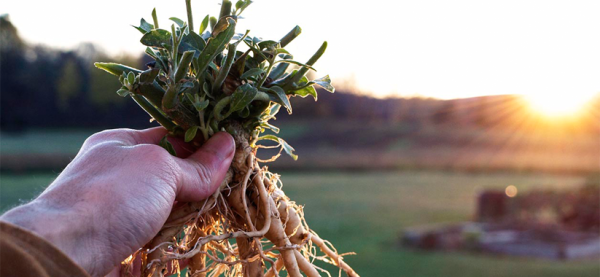
References
- Horiuchi S, Tsuda A, Aoki S, Yoneda K, Sawaguchi Y. Coping as a mediator of the relationship
between stress mindset and psychological stress response: a pilot study. Psychology
Research and Behavior Management. 2018;Volume 11:47-54.
doi:10.2147/prbm.s150400. - Singh VK, Mundkinajeddu D, Agarwal A, et al. Adulteration of Ashwagandha (Withania
somnifera) Roots, and Extracts. Botanical Adulterants Prevention Bulletin. January 2019. - The Editors of Encyclopaedia Britannica. Ayurveda. Encyclopædia Britannica.
https://www.britannica.com/science/Ayurveda. Published August 15, 2019. Accessed
December 1, 2019. - Ayurvedic Pharmacopoeia Committee. Asvagandha. In: The Ayurvedic Pharmacopoeia of India,
Part I, Volume I. New Delhi, India: Government of India, Ministry of Health and Family
Welfare, Department of Ayurveda, Yoga & Naturopathy, Unani, Siddha and
Homoeopathy (AYUSH), 1989. - Gerson S. The Ayurvedic Approach to Rejuvenation: Rasayana Chikitsa. The Gerson Institute of
Ayurvedic Medicine. http://ayurveda.md/usefull-links/129-rasayana. Accessed
December 1, 2019. - Caraka, Agniveśa , Dr̥ḍhabala , Sharma PV. Caraka-Samhita: Text with English Translation and
Critical Notes. Varanasi, India: Chaukhambha Orientalia; 1994. pp 8. - Gardner T. The Characteristics, Benefits and Application of Ashwagandha in the West. California
College of Ayurveda. December 2015. - Bhattacharya SK, Goel RK, Kaur R, Ghosal S. Anti-stress activity of sitoindosides VII and VIII, new
acylsterylglucosides from Withania somnifera. Phytotherapy Research. 1987;1(1):32-37.
doi:10.1002/ptr.2650010108. - Chandrasekhar K, Kapoor J, Anishetty S. A prospective, randomized double-blind, placebo-
controlled study of safety and efficacy of a high-concentration full-spectrum extract of
Ashwagandha root in reducing stress and anxiety in adults. Indian Journal of
Psychological Medicine. 2012;34(3):255. doi:10.4103/0253-7176.106022. - Lopresti AL, Smith SJ, Malvi H, Kodgule R. An investigation into the stress-relieving and
pharmacological actions of an ashwagandha (Withania somnifera) extract. Medicine.
2019;98(37). doi:10.1097/md.0000000000017186.
Image References
IMG 1
IMG 2
IMG 3
IMG 4
IMG 5
IMG 6
IMG 7
IMG 8


LOVELAUGHTER&&XHAOS
Cat-herder aka Chief Bigstick
High Priest, Church of Erin
Erisian Ataxia Troupe : Caste of the Black Star


I have been using it in powdered form for the last few weeks, I add it to my smoothie in the morning and I have found it really helpful. Prior to this I was starting to feel overwhelmed with my current situation and now I have found that I am able to focus more on what I need to do in the day and it has also increased my energy levels. I would highly recommend it. I was using mushrooms last year for similar reasons (mainly adaptogen properties) and found Ashwaganda to be just as powerful. Thanks for this very insightful article my friend and happy to hear that it has been beneficial to you too xx
I recently started using the powder form myself. I think I’m beginning to prefer the powder to the tincture. That’s so great to hear that you’ve been finding it so helpful in your life! It’s a really amazing herb, and I too would highly recommend it to others.
Ashwanghwa is just my fave, as you know. I find it better than a coffee in the morning - it seems to have that nootropic effect on me without the buzz of caffeine. I'm just wondering whether that bag of powder is worth taking through customs lol - but since I'm headed to the home of ayurveda, who sees withuania as a queen, I don't doubt I'll find this beauty there!
rishikesh is great place to get some.. ask around you will find many kinds there.. Theres a good big organic shop in the centre of Rishikesh, you cant miss it.. they will have some for sure..
I’ve been pairing ashwaganda with bacopa monieri and it’s given me a great focus/energizing effect.
I’m sure you’ll have no issues crossing with a bag of ashwaganda!
Great article! I've had a jar full of encapsulated ashwagandha for awhile now, and you've finally convinced me to check it out. I'm glad you have found some relief, and I wonder what other benefits you will start to notice. 💖
Posted using Partiko Android
My life took a 180 it felt like after taking ashwaganda! Let me know if it helps once you start taking it:) Nice to hear from you ❤️
Pulling it out of the cabinet this very second! Do you prefer the tincture over the capsules? Good to see an article of yours BTW. Love we can stay connected, one of the positive benefits of technology.💜 Have a great day, my friend. Another BTW moment, been listening to lots of Alan Watts. So grateful for your suggestions over the years.
Posted using Partiko Android
I love technology for that very reason! Glad you’re getting into Alan Watts. He’s got a lot of really great material!!
I have recently found that I prefer taking the powdered form over the tincture, though I put it in my smoothies and not in capsules.
Ah good point, I'm not fond of swallowing pills/capsules.😊
Posted using Partiko Android
Been meaning to look into ashwagandha, so this must be karma!
@tipu curate
Upvoted 👌 (Mana: 15/20 - need recharge?)
I definitely recommend it!
Thanks 😊
This post was shared in the Curation Collective Discord community for curators, and upvoted and resteemed by the @c-squared community account.
If you are a community leader and/or contest organizer, please join the Discord and let us know you if you would like to promote the posting of your community or contest.
@c-squared runs a community witness. Please consider using one of your witness votes on us here
This post has been voted on by the SteemSTEM curation team and voting trail. It is elligible for support from @curie and @minnowbooster.
If you appreciate the work we are doing, then consider supporting our witness @stem.witness. Additional witness support to the curie witness would be appreciated as well.
For additional information please join us on the SteemSTEM discord and to get to know the rest of the community!
Please consider using the steemstem.io app and/or including @steemstem in the list of beneficiaries of this post. This could yield a stronger support from SteemSTEM.
Wow that some deep research personally my stress relief is getting out in the woods and lighting a fire. Or just walking around barefoot but I this works well sometimes we need a boost when the stress overcomes us too much all the best 💯🐒
Ahh, nice to hear from you friend! Forest bathing is a fabulous way to relieve stress. Ashwaganda and other adaptogens help cope with stress though, which is a bit different than stress relief. I definitely think getting out in the woods is incredibly helpful though:)